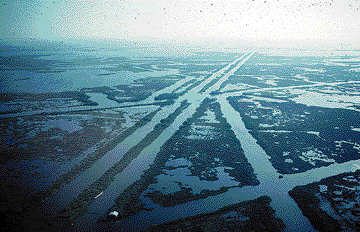Bludgeoning Big Oil With Katrina
It comes as a shock to no one that Greenies, Warmies and the hodge-podge of progress-haters like to tag humans with blame every time a natural disaster hits. I can see the headline:
Today there's a headline over an AP story that's not quite as extreme, but is definitely from the same school of attack journalism:
 It's a legitimate question to ask what the 10,000 miles of canals dug years ago through the Louisiana marshes have done to the area's environment. At a minimum, the canals have changed saltwater-freshwater dynamics and caused dredged materials to be piled as fill on surrounding marshland.
It's a legitimate question to ask what the 10,000 miles of canals dug years ago through the Louisiana marshes have done to the area's environment. At a minimum, the canals have changed saltwater-freshwater dynamics and caused dredged materials to be piled as fill on surrounding marshland.
Sensible study of these matters could lead to a plan that would rectify past damages, prevent future damages, while still allowing the benefits of the oil canals to be realized.
Oops. Did I say "benefits?" Nowhere in the 48-paragraph story does the reporter, Cain Burdeau, detail why the canals were built, how they're used or what the Louisiana economy would be like without them. And nowhere does he contrast the regulatory environment today with what it was when the canals were dug, leaving the impression that nothing's changed.
Burdeau doesn't even allow the oil industry to open its mouth until paragraph 41, and then it's a couple quick paragraphs clipped onto the end of the story. According to the story, the oil industry doesn't provide anything useful anyway; rather, it is just "'sucking out of the ground so much oil and gas."
Burdeau says the oil industry is dodging criticism because of a big PR campaign -- not because they provide a lot of benefit and have changed due to intensive regulation -- so he and others are launching their own PR campaign, based on the premise "If what we've done hasn't driven them out, let's blame them for something much bigger."
It's classic journo-crap. Find a problem no one's paying much attention to, bleed deeply over it personally, and trump up a bigger charge against it, in the hopes you've finally found the silver bullet that will kill the bad guy.
Budreau isn't a journalist; he's a pimp to the lawyers of Save Our Wetlands. Write it straight, write it honest, or get a job with the Greenies.
Asteroid Rushes to Earth:
SUVs Blamed
SUVs Blamed
Today there's a headline over an AP story that's not quite as extreme, but is definitely from the same school of attack journalism:
Did oil canals worsen
Katrina's effects?
Katrina's effects?
 It's a legitimate question to ask what the 10,000 miles of canals dug years ago through the Louisiana marshes have done to the area's environment. At a minimum, the canals have changed saltwater-freshwater dynamics and caused dredged materials to be piled as fill on surrounding marshland.
It's a legitimate question to ask what the 10,000 miles of canals dug years ago through the Louisiana marshes have done to the area's environment. At a minimum, the canals have changed saltwater-freshwater dynamics and caused dredged materials to be piled as fill on surrounding marshland.Sensible study of these matters could lead to a plan that would rectify past damages, prevent future damages, while still allowing the benefits of the oil canals to be realized.
Oops. Did I say "benefits?" Nowhere in the 48-paragraph story does the reporter, Cain Burdeau, detail why the canals were built, how they're used or what the Louisiana economy would be like without them. And nowhere does he contrast the regulatory environment today with what it was when the canals were dug, leaving the impression that nothing's changed.
Burdeau doesn't even allow the oil industry to open its mouth until paragraph 41, and then it's a couple quick paragraphs clipped onto the end of the story. According to the story, the oil industry doesn't provide anything useful anyway; rather, it is just "'sucking out of the ground so much oil and gas."
Burdeau says the oil industry is dodging criticism because of a big PR campaign -- not because they provide a lot of benefit and have changed due to intensive regulation -- so he and others are launching their own PR campaign, based on the premise "If what we've done hasn't driven them out, let's blame them for something much bigger."
Still, when politicians in Washington or Louisiana talk about Katrina guilt they blame the Corps of Engineers, global warming and the French for building a city in low-lying swamps nearly 300 years ago — but not the oil industry.And
"It's the elephant at the dinner table and nobody wants to say there's an elephant there," said Luke Fontana, a New Orleans lawyer for Save Our Wetlands, one of the state's oldest grassroots environmental groups that has fought the draining of swamps and oil company activity since the 1970s.
[The canals] also connect an overlooked set of dots in the Hurricane Katrina aftermath: The role that some say the oil industry played in the $135 billion disaster, the nation's costliest.The article presents not a single meteorologist to reinforce its premise -- probably because they all would have scoffed at the idea. Katrina was just too big and too nastily positioned to be bothered much by man-made affairs.
It's classic journo-crap. Find a problem no one's paying much attention to, bleed deeply over it personally, and trump up a bigger charge against it, in the hopes you've finally found the silver bullet that will kill the bad guy.
Budreau isn't a journalist; he's a pimp to the lawyers of Save Our Wetlands. Write it straight, write it honest, or get a job with the Greenies.
Labels: Budreau, Environment, Katrina, Media, Media bias, Oil




<< Home